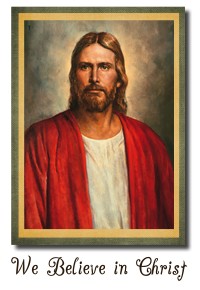
“And she brought forth her firstborn son, and wrapped him in swaddling clothes, and laid him in a manger; because there was no room for them in the inn” (Luke 2:7).
"To better understand this verse, we need to be aware of the culture of that time and region, and we need to learn one word from the original Greek text. In the Greek New Testament, the root from which inn was translated is kataluma. We don’t have an equivalent word in the English language. The Greek prefix kata- (or cata-) means “a bringing down.” We see it in English words such as catastrophe and cataclysm. When the prefix kata- was joined with the suffix -luma, it meant literally “a breaking down of a journey.” A kataluma was a place to rest or to lodge, or a guest chamber in a lodging place.
"In those days an inn was not like a Holiday Inn or a Bethlehem Marriott. A lodging place in that part of Asia had to provide accommodations for traveling caravans, including the people and their animals. Caravans stayed at what was then, as still is, known as a caravansary, or a khan.
"Such a facility is typically rectangular in shape. It has a central courtyard for the animals that is surrounded by walled cubicles where the people rest. These quarters allowed guests to be elevated slightly above their animals, with open doorways so that owners could watch over their animals.
"The Joseph Smith Translation of Luke 2:7 indicates that there was no room for them in the “inns,” suggesting that all of the katalumas or cubicles of the caravansary were occupied.
"At a caravansary, animals were secured for the night in the center courtyard. In that courtyard there would have been donkeys and dogs, sheep, and possibly camels and oxen, along with all of the animals’ discharges and odors. Because the guest chambers surrounding the courtyard were filled, Joseph possibly made the decision to care for Mary’s delivery in the center courtyard of a caravansary—among the animals. There, in that lowly circumstance, the Lamb of God was born.
"Why was reference made twice in Luke 2 to His being wrapped in swaddling clothes? I sense a significance beyond the use of an ordinary diaper and receiving blanket.
"Instead of those four words: “wrapped in swaddling clothes” in the English text, only one word is needed in the Greek New Testament. That word is sparganoo, which means to envelop a newborn child with special cloth, strips of which were passed from side to side. The cloth would probably bear unique family identification. That procedure was especially applicable to the birth of a firstborn son.
"You remember the announcement of an angel at the birth of Jesus: “This shall be a sign unto you; Ye shall find the babe wrapped in swaddling clothes, lying in a manger” (Luke 2:12). His wrappings surely would have been distinctive.
"What about the manger? The French word, manger means “to eat.” A manger is a trough or an open box in a stable designed to hold feed, provender, or fodder for animals to eat. Elevated from the floor of the contaminated courtyard, a manger was probably the cleanest site available. Such a feeding trough became the cradle for our Lord!
"Now, two millennia later, though we don’t know all the details pertaining to His birth, we certainly understand the unique parentage of this Babe of Bethlehem. We declare solemnly and with conviction: Jesus was born of an immortal Father and a mortal mother. From His immortal Father, Jesus inherited the power to live forever. From His mortal mother He inherited the fate of physical death.
"Our recollections of Christmas are enriched by these realities. Each one of us with a testimony of the Lord has the privilege in faith to know of His divine parentage and to testify that Jesus is the Son of the living God.
"Jesus descended below all things in order to rise above all things. He expects us to follow His example. Yoked with Him, we can rise above all challenges, no matter how difficult they may be.
"As a special witness of His holy name, I testify that Jesus is the divine Son of the living God. He will love you, lift you, and manifest Himself unto you if you will love Him and keep His commandments."
To read the full article, go to Russell M. Nelson, “Christ the Savior Is Born,” NewEra, Dec 2006, 2–5



















